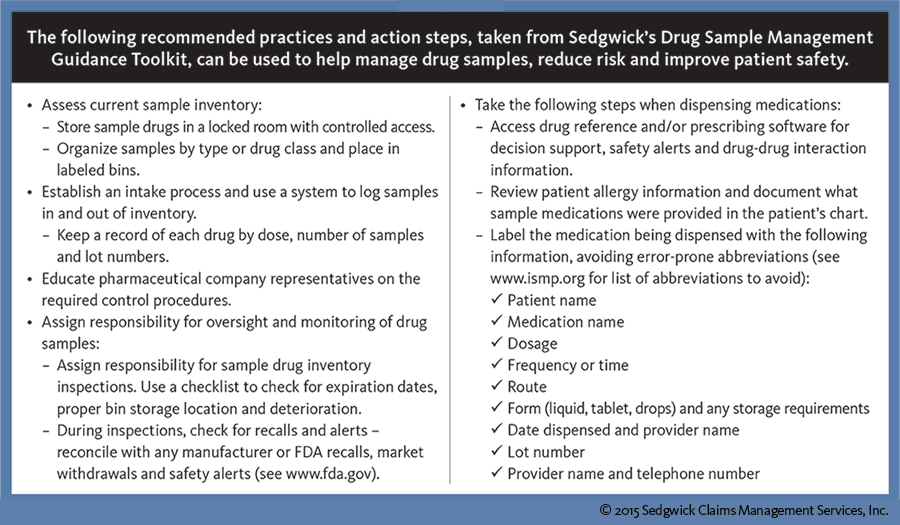
Managing drug samples in a physician’s office or ambulatory care clinic requires a system of checks and balances to help prevent medication errors and adverse drug events, establish a tracking system for alerts and recalls to comply with federal laws and regulations, and to protect from loss of inventory/pilferage. Also, medication dispensing should be held to equivalent standards of care whether done by a provider office or a pharmacy. Some organizations have stopped distributing sample medications in their provider offices to eliminate the need to manage them or to avoid any legal and ethical issues that can arise when free samples are provided by pharmaceutical company representatives. Others have deemed that the economic benefits to patients and the convenience of starting drug therapy at the time of the visit outweigh the time and effort needed to manage the samples and put sample control systems in place.
The patient safety and liability risks of drug samples include:
- Improper labeling
- Medication errors
- Incomplete patient monitoring
- Lack of appropriate tracking
- Inattention to expiration dates
- Theft
While handling of pharmaceutical samples by physician offices is largely unregulated, state medical practice acts generally allow physicians and certain other providers with prescribing authority to dispense drugs from their offices. However, from a risk management and patient safety perspective, physician offices that dispense samples need to be sure that patient education is provided and that samples are kept secure from patients and staff who are not authorized to prescribe and dispense them. This is an often-neglected function that Sedgwick consultants find when assessing office practices. Frequently, safeguards are not in place and there is a lack of understanding of safe drug sample management.
Sedgwick’s Drug Sample Management Guidance Toolkit offers recommended practices and action steps; see excerpt below.

Sample medications can be important to many patients when managing their health. Whether due to financial issues, limited access to a medication while waiting for a prescription renewal or for the purpose of evaluating the effectiveness of a newly prescribed medication, many physicians feel strongly about providing sample medications to their patients. When managed as outlined above, the handling and distribution of sample medications can be a win-win for patients and providers.
For more information about the Drug Sample Management Guidance Toolkit, contact HealthcareRM@sedgwick.com.
Kathy Shostek, RN, ARM, FASHRM, CPHRM, CPPS, Vice President, Health Care Risk Management